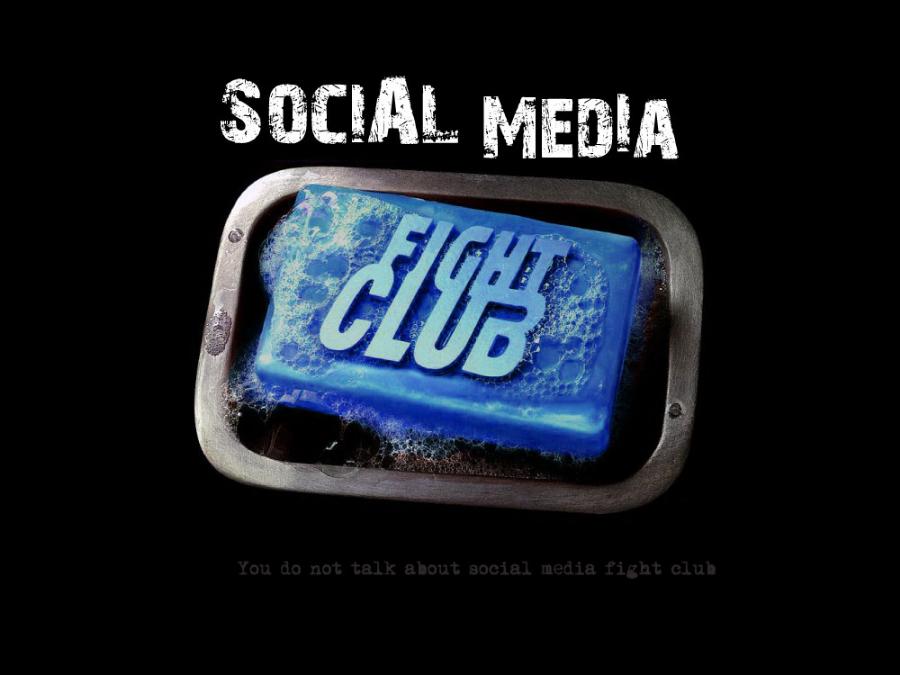
Additional reporting by Tom Cheredar.
The Internet loves a good fight, and this year, social media companies (and their fearless leaders) gave us all ringside seats to some real knock-down-drag-outs.
From the silly slap-fights to the lawyering-up, big-boy brawls, here were our 10 favorite Internet feuds from 2012.
10. ChatRandom v. Airtime

Internet oldster Sean Parker launched his own ChatRoulette clone, Airtime, back in June. But as quickly as this piqued our interest, the brand-new service’s traffic started to falter. ChatRandom founder Allen Fox was quick to use the failure as an opportunity to brag about his own service’s successes.
The story: “ChatRandom was founded earlier than Airtime, in mid-2011, but with much less money and much less fanfare. Why is that site seeing successful user growth while Airtime, with its star founders, tens of millions in cash, and celebrity endorsements is failing? Fox cites just one reason, but I see at least two.”
Winner: ChatRandom. Survival of the fittest.
9. Yammer v. Yahoo

Yammer’s CEO got mouthy when he saw Yahoo getting litigious with Facebook over patents. In a sideshow spat to the main spectacle of patent-law theatre, David Sacks tweeted, “I’m declaring it: Yammer will never hire another former Yahoo employee who doesn’t leave in the next 60 days. Who will join me? #stopyahoo.”
The story: “’People were telling me I need to think of the Yahoo rank and file, folks who have families, but the talent market in Silicon Valley is so hot right now, the only folks staying at Yahoo are the ones who have stopped caring,’ Sacks told VentureBeat.”
Winner: Yahoo. Sacks’ stigma sucked.
8. Yelp v. Google

In this ongoing case, Yelp sued Google for incorporating Yelp users’ reviews into Google Places. While the freebie content helped Google’s web search users make better decisions about where to eat, stay, or buy dog food, Yelp said the content wasn’t up for grabs in the first place. The whole hoopla prompted an FTC look-see, but the feds are now stalling their decision until 2013 — possibly due to a lack of evidence against Google, possibly due to Google’s own backing down.
The story: “After a year of investigation, FTC investigators recommended charging Google under antitrust laws after agents found that Google illegally abused its power as the dominant search engine. Now, however, Google may be ending the FTC probe and heading off any pending legal action by promising to change and be good.”
Winner: Google. All’s well that ends well for the search ogre, especially if Google can wiggle out of fines.
7. App.net v. Real Social Media

For everyone who’s complained about Instagram’s terms of service, Facebook’s privacy policy, or Twitter’s stance on copyright, App.net promised to save the day by — gasp! clutch pearls! — actually charging users for its services. In doing so, App.net sidestepped the whole problem of making money from advertisers and brands by giving them access to (anonymized, aggregated) user data.
The story: “If you remember that Mark Zuckerberg used to talk about Facebook as a ‘social utility,’ App.net founder Dalton Caldwell is really serious about simply providing electricity, or water, or maybe, more aptly, a dial tone. Most of the cool stuff with bells and whistles and cute puppies in pink will come from the apps that developers build on top of the infrastructure.”
Winner: Real social media. Oh, come on, who are we kidding? Like your mom is going to pay $50 a month for a subpar Facebook no one actually uses.
6. Twitter v. Developers

Twitter’s longstanding war with its own ecosystem of third-party developers seemed to be drawing to a ceremonious close at the end of 2011. In a string of gentle warnings and announcements, the company had made it clear that the Twitter API wasn’t intended for clients — stuff like Tweetbot and UberSocial. Then in 2012, Twitter started shuttin’ ’em down, strangling or cutting off API access for violators. Some, like the Twheel team, went straight into utter denial.
The story: “Twitter has put the kibosh on unofficial consumer clients for Twitter; the only loophole is for apps that have 100,000 users or fewer. The Twheel team has just decided that to keep the app alive, they’re going to take that loophole. And in an Internet economy where eyeballs equal money, 100,000 users or fewer still meets our definition of ‘doomed.’ You can’t raise funding on 100,000 users, and you can’t sell ads against 100,000 users — not enough ads to support a whole company, anyhow.”
Winner: Twitter. “You’ve heard of the Golden Rule, haven’t you? Whoever has the gold makes the rules.” Substitute “API” for “gold,” and you’ve pretty much got the gist of it.
5. Google v. Twitter

How’s this for a zinger: Google rolls out its latest social search product, and Twitter immediately calls the whole thing “bad for people, publishers, news organizations, and Twitter users.” That’s a whole lotta bad.
The story: “Perhaps it is because of a tweet’s brevity that news is broken so frequently on the site and can be valuable with the addition of multimedia such as video, photos, and links. Alex Macgillivray, Twitter’s general counsel, tweeted this was a ‘bad day for the Internet,’ and having worked for Google, said, ‘I can imagine the dissension at Google to search being warped this way.'”
Winner: Twitter Does anyone use Google’s social search stuff? No? Just the regular web search? ‘Kay. Just checking.
4. Twitter v. LinkedIn

In July 2012, Twitter announced it would no longer let people autopost their tweets to LinkedIn. For power-tweeters/power-networkers, it was like the whole social flow of things got horribly constipated.
The story: “LinkedIn is going to overtake Twitter (and very quickly) in terms of importance and volume for users posting industry-related news. Twitter may still dominate the ‘what I had for breakfast’ general and social news posts, but the audience for industry news will move to LinkedIn. And guess which is more valuable to an advertiser?”
Winner: LinkedIn. Between its vastly improving designs and its power in the professional world, the Twitter block-up didn’t hurt LinkedIn one bit. Besides, you can still use LinkedIn to autopost your updates to Twitter. Take that, Twitter!
3. Digg v. Digg

From Reddit/4chan competitor and general powerhouse to Internet laughingstock, Digg’s fallen a long way since its 2009-2010 heyday. In 2012, its founder finally backed away completely from the site, and the whole thing got sold to Betaworks at the bargain-basement price of $500,000. Betaworks then rebuilt Digg from the ground up, scrapping all the features — and the content — that had made Digg both great and corrupt throughout its traffic-trafficking history. And no one was more pissed about that than Digg’s onetime community leaders.
The story: “The trouble is that unlike previous fallen cultures it has no remaining ruins. Digg deleted its ruins. A vandalism completed by the final Betaworkian invaders. It’s more like Carthage after the Third Punic War. Every scroll burned, every brick pulverized and salt sown into the fields. External sources are the only record of its former glory.”
Winner: No one. A house (or a web community) divided against itself cannot stand.
2. Yahoo v. Google

Yahoo and Google didn’t have much public, out-and-out fighting this year, but Google had to take one huge blow square on the jaw: Marissa Mayer, who took her high visibility and her product genius from Google, where she was stagnating, to Yahoo, where she became the company’s new CEO.
The story: “Money, beauty, love, and a fabulous career — is there anything Mayer doesn’t have? The one thing she lacked is the sole reason she’s now at Yahoo: Power. … After building up so much momentum in 2009 and 2010, Mayer’s rise to the top was suddenly stopped. And it’s obvious that if Mayer wanted to continue to fulfill her potential as one of the country’s most powerful executives, Google was not going to be where she would do so.”
Winner: Yahoo. We’re in Mayer’s corner on this one.
1. Instagram v. Twitter

Who didn’t see this coming? Facebook bought Instagram in a splashy, billion-dollar deal, and we expected Instagram would still be playing footsie with the rest of the Internet? As if! Instagram photos stopped displaying properly in Twitter cards, and a few days later, the cat was out of the bag: Instagram had stopped playing nicely with Twitter altogether. Twitter obviously saw this move coming, too, and responded with a few tricks of its own: Instagram-like filters for photos posted directly from Twitter’s own apps.
The story: “Twitter’s own homebrewed filters mean that Twitter-official-app-generated photos will show up in feeds without any hangups and with full previews. The downside is that you have fewer options for filters, but most of the Twitter filters don’t appear to be as heavy-handed as some of Instagram’s filters.”
Winner: Flickr. Because lots of people are so disgusted with Instagram and Twitter now, Flickr has seen the biggest flood of activity in years. It helped that Yahoo released a new Flickr iOS app with new filters just shortly before this dustup started.
Image credits: Tom Cheredar, stwef/Flickr, thomashawk/Flickr, Harris Shiffman/Shutterstock, Vgramatikov/Shutterstock, Nan Palmero/Flickr, nComment, Jolie O’Dell/Flickr
VentureBeat's mission is to be a digital town square for technical decision-makers to gain knowledge about transformative enterprise technology and transact. Learn More

